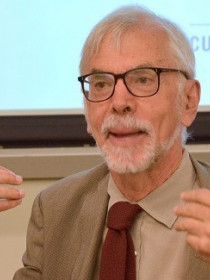
Nicholas Freudenberg
Connect with Nicholas
About Nicholas
Freudenberg's research focuses on the impact of corporate business and political practices on public health. Freudenberg analyzes how changes in 21st century capitalism have influenced global patterns of health and disease. A main focus of his work is on the role of global food business in food insecurity, diet-related diseases, and the rise of low wage food work. Freudenberg also studies the role of social movements and civil society in creating alternatives to health damaging social and economic policies.
Contributions
Preventing Type 2 Diabetes among Young People in New York City
In the News
Publications
Shows some of the strategies that have been used to challenge patents on HIV treatment and prevention drugs both in the U.S. and globally. Reviews several case studies of efforts to overturn patents, with the hope that we can glean lessons from these cases to inform efforts to improve access to generic COVID-19 treatment and prevention medicines and technologies.
Examines lessons on restoring food security extracted from analyses of prior responses to natural and human-made disasters and assesses their relevance for responses to covid pandemic.
Identities strategies for assessing the role of market actors and market forces on patterns of health and disease across nations, business sectors and time.
Assesses the impact of the covid pandemic and its economic consequences on the physical and mental health, food security and financial stability of students at the City University of New York.
Analyzes how changes in 21st century capitalism have contributed to premature deaths and preventable illnesses across countries and business sectors and explores roles of social movements, governments, and others in creating healthier, more equitable and sustainable alternatives.
Suggests six unifying goals for a broad based alliance that can change those elements of 21st century capitalism most associated with global public health crises.
Analyzes how corporate use of power influences health and the global politics that shape health.
Examines the intersecting roles of characteristics of people, products, and food industry practices in making ultra-processed food, a leading cause of premature death and preventable illness, so appealing.
Describes academic, health and other challenges facing City University of New York students who are also parents of young children.
Provides an overview of history and policies influencing college students’ enrollment in Supplemental Nutrition Assistance Program and suggests strategies for strengthening SNAP’s capacity to reduce food insecurity and hunger in this population.
Bases on New York City Food Metrics Reports, mandated by the City Council since 2012, analyzes the strengths and weaknesses of the city’s reporting on its food programs and policies and suggests ways to make these reports more useful for achieving a more equitable and efficient food system.
Describes several food initiatives launched in Central Brooklyn by the Bedford-Stuyvesant Restoration Corporation and assesses their impact on food access, quality, and affordability